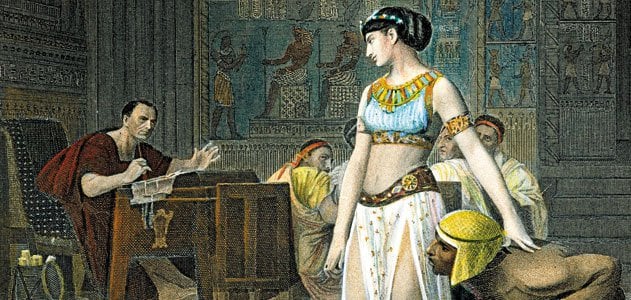
A Netflix docudrama series portraying Queen Cleopatra VII as a black African resulted in a wide controversy in Egypt, leading to a lawsuit and calling for its ban. But the underlying read of it all is far more profound.
By Marita Kassis
In the latest woke move, Netflix launched a Cleopatra documentary with a black Queen Cleopatra. The documentary, produced by Jada Pinkett Smith, was enough reason for Egyptian lawyer Mahmoud al-Semary to sue Netflix, accusing it of attempting to “erase the Egyptian identity” by casting biracial actors and depicting the queen’s skin colour in black.
The work, Queen Cleopatra, is part of a series Smith produces on African Queens.
Netflix has always been a point of contention with the Arab world. Several calls were made to have the streaming giant ban content from specific countries, the last of which was last week’s call in Egypt.
In September 2022, according to media reports, Gulf states demanded that Netflix remove content offensive to "Islamic and societal values." The request came from the Riyadh-based General Commission for Audiovisual Media. Another similar message resonated from the United Arab Emirates, saying that the content violated broadcasting regulations in the Gulf Cooperation Council [GCC]: Saudi Arabia, the UAE, Bahrain, Oman, Qatar and Kuwait.
The uproar that Netflix caused this time was not about contesting Islamic values but about depicting an ancient queen, dear to all, as black. Queen Cleopatra, is part of Egyptian heritage and pride, and holds the busiest account of her afterlife, with stories and actions being told until this day. She was of Macedonian descent and was the last queen of the Macedonian dynasty, who ruled between 51 and 30 BC.
Zahi Hawass, a prominent Egyptologist and former antiquities minister, told the al-Masry al-Youm newspaper: "Cleopatra was Greek, meaning that she was light-skinned, not black" and that such a depiction was far from facts or reality.
Although this might sound like an immediate reaction to Netflix docudrama, the debate goes back for centuries. The ruler’s race continuously makes headlines in Egypt, and her lineage is always a point of discussion. Some say she comes from many Egyptians, while others say she was Greek.
Nevertheless, she is an Egyptian queen remembered for her tactics, love stories, and iconic figure. Her representation on TV or the big screen caused discontent at various times. The role which was to be played by Gal Gadot on the big screen, resulted in a brutal backlash for having an Israeli play the part of the Egyptian queen, saying that it is “an act of cultural piracy for an Israeli to play the Egyptian role.” The movie was never made.
Egypt has known many kings and queens, but Cleopatra lived in a highly literate age. Her actions and plans influenced Roman history and the formation of the Roman Empire, and as such, her story cannot be forgotten. Her life has been documented intrinsically due to her relationships with Julius Caesar and Mark Antony, and the internal Roman struggle for power that ensued with Octavian.
Cleopatra VII became queen at 18, ruled Egypt for 21 years, and died at the age of 39; she is among the most known, remembered, and mentioned figures in Egyptian history. She might be portrayed as a strong, powerful woman whose passion for love allowed her to hold the Western world's fate in her hands for a brief moment.
There is more to this queen than a love symbol and a history of seduction. She ruled a kingdom, which she lost, and fought to keep it. She built an empire and lost it – like all empires which come to an end.
During the peak of her power, “she controlled virtually the entire eastern Mediterranean coast, the last great kingdom of any Egyptian ruler.” She believed herself to be a goddess and saw no limit to her thirst for power: she made sure to be intellectually competitive and cunning while ruling politically and militarily with strength and determination.
Cleopatra is an issue of national pride; although some Egyptians believe that she was black others believe her to be white. This deep ongoing debate swings the needle between Egypt and Africa: the descendants, lineage, travels, and political roles. Egypt is known for its multicultural, multi-layered society. However, like in any other organisation, frictions, communal differences, and sensitivities quickly surface, especially in political tension.
Egypt is known for being a haven for sub-Saharan African refugees fleeing their home countries, but unfortunately, various reports recorded rising incidents of harassment and racism. According to the United Nations International Organization for Migration (IOM), Egypt is home to more than 6 million migrants from Sudan and South Sudan.
Following various incidents that went viral on social media, Egypt’s President Abdel Fattah el-Sisi hosted a young Sudanese boy subjected to racism by three Egyptians at a youth forum. The latter was held in a resort in Sharm el-Sheikh. The president rarely acknowledged the issue, addressing the audience by saying, " They are our guests, and negative treatment is unacceptable and not allowed.”
Whether a question of racism or historical inaccuracy, Netflix turned off the comment section on YouTube on the Queen Cleopatra trailer, which was aired on April 12. It is still being determined whether the series will stream in Egypt. Cleopatra's legacy is part of Egyptian’s daily lives portrayed in ancient and modern works of art.
She is an Egyptian Queen who made it through history and whose rule survived in Medieval and Renaissance literature –to the polemics of ongoing debates of identity, historical revisionism, and national treasures.







How about the money part of
The Cleopatra Story?
This part could reveal a lot.
I watch things on Netflix quite a lot, which depict history in an artistic manner, and not according to facts. I always look for the part that is tweaked, and ask myself,
Why did they do that? Why? …
Sometimes I believe it is to draw attention to that one thing, and for people to have a bourgeois discussion about it.
How would you like to collaborate with me and right The Cleopatra Story, including the money part?
I invite you,
Angel NicGillicuddy
I’m noticing from the picture that you used for the article that Cleopatra looks like she could be a dancer, and Cesar looks like he is a bit surprised to see her.
That scenario reminds me of another main stream news story.
We’ll never know the truth about anything as long as the money part of the story is either left out or distorted according to “the hoardable money globalist money power establishment”.
💜 Angel NicGillicuddy
Cesar needed/ used Cleopatra,
(she was the daughter of a military general)
to build his military forces in the region,
by paying them of course.
Everything went well until there was a money shortage;
the money being vacuumed
out of circulation,
then there was an economic recession, and she lost her empire.
Later on,
Cesar lost his empire too,
and for the same reason.
“The Invisible Alliance for hoardable money”
goes way back.
Jesus came along after Cleopatra,
to begin
The Alliance for declaring demurrage (holding charges) on the money,
but Mainstream Media
overpowered Him,
fooling the people into believing it was him who was the bad guy,
Trump can tell you all about it.
💜 Angel NicGillicuddy
Netflix is not doing well financially,
and this movie is just a desperate attempt
to stay alive,
financed by the USURY specialists;
The Alliance for hoardable money,
to stir up conflict; racism again.
Better would be if Netflix would join
“The Alliance for declaring
demurrage (holding charges)
on the money”,
and make
The Alliance for hoardable money
SUBSERVIENT,
which is much better than trying to sue their Agents,
whereby even more money gets laundered by shifty Attorneys.
💜 Angel NicGillicuddy
I invite you to join
The Alliance for declaring
demurrage (holding charges)
on the money,
Russia and China etc
are already at the table.
And soon Trump 💜
will be coming to the table =
The Secret Plan to
END THE WAR in 24 hours;
THE BIGGEST NEWS STORY
BREAKING NOW.
Black people (whatever that means)
should investigate the history of
Ethiopia, then they would learn the truth about why slavery happened in America.
💜 Angel NicGillicuddy
Ethiopia had a very bad economic depression crisis, which led to lots of Ethiopians desperately seeking for work.